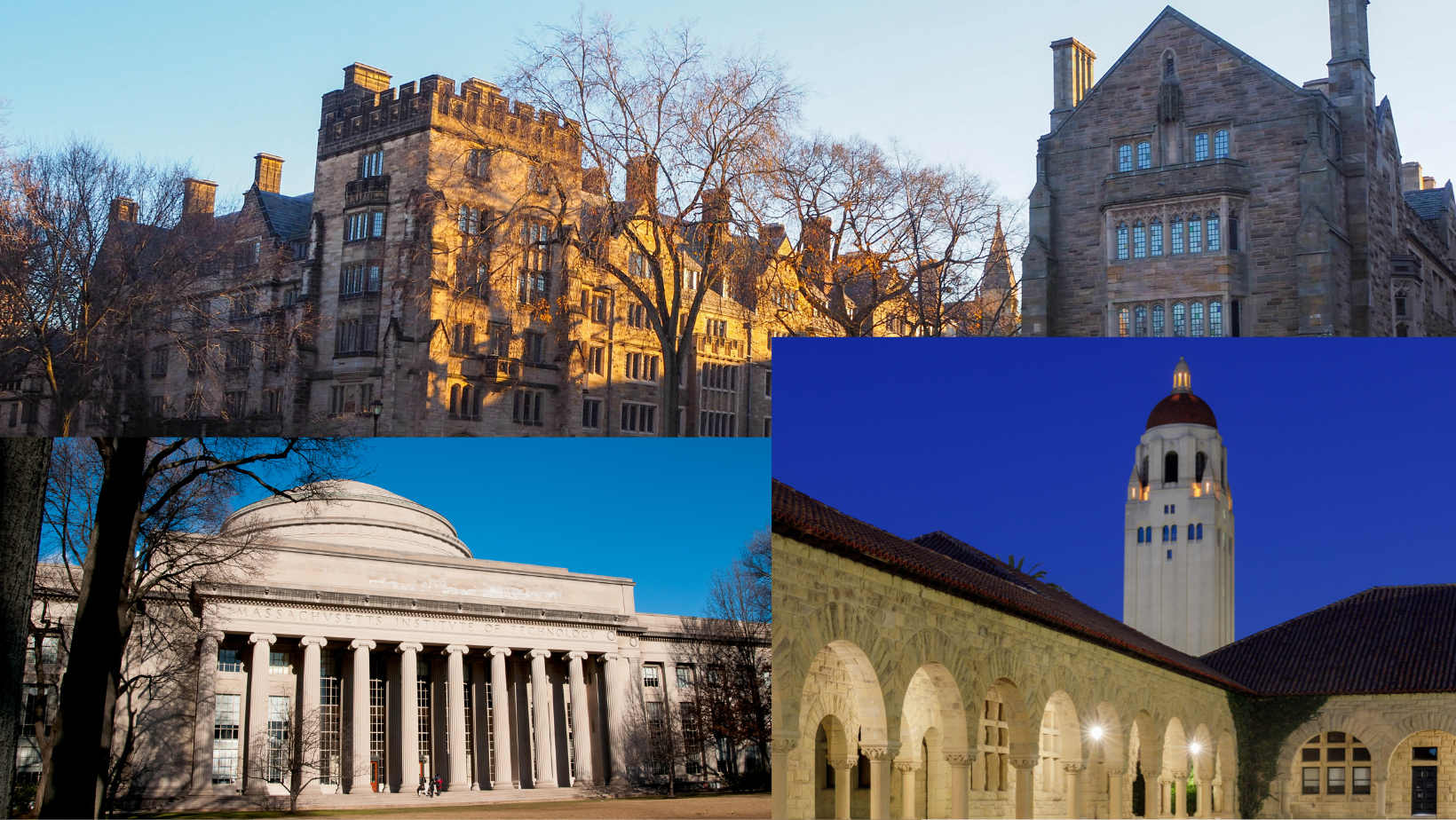What is the salary payoff for graduates of top colleges?
It is widely believed that those who attend highly selective colleges generally start out with a bigger advantage than those who do not. These top colleges open the doors to high paying or high prestige jobs at brand name employers upon graduation, and the degree from a top college keeps those doors open for a very long time.
The colleges with single digit acceptance rates stand out as very elite bastions that are excruciatingly difficult to get admitted to, and they are also the ones that open the greatest number of doors.
While potential earnings play a significant role in why so many families work hard to help their children get admitted to these highly selective colleges, these colleges also offer world class opportunities to develop critical thinking skills, expand intellectual horizons, get taught by world renowned experts in their fields (though not always) and enable you to be part of a crowd of super smart peers who will challenge you to be your best. If you are good at it, the network you develop will also be priceless for your future endeavors.
While starting salaries will never be the only criteria in creating a college list, attending college is now so expensive that few can afford to ignore their future earnings potential as a serious factor to be considered. If you have the right combination of academic performance and X Factor that makes you a strong applicant at a highly selective college, then by all means go for it and apply for admission.
Which doors do the highly selective colleges open?
High Paying Jobs in the Financial, Management Consulting and Tech Industries
If getting a high paying job at graduation is an important goal for you, then a degree from a top college is more likely to help you achieve that goal.
The businesses that offer new graduates very high starting salaries are concentrated in the financial, management consulting and tech industries. The major players in these industries focus their on-campus undergraduate recruitment at only a few highly selective colleges to fill their fast track entry level jobs. Typically, about 5% to 8% of a graduating class from the highly selective colleges will land one of these highly coveted jobs.
Newly graduated investment banking analysts at the major banks are paid a base salary of $110,00 plus a bonus of between 50% to 100% of base in their first year on the job. Junior management consultants are paid starting base salaries of between $90,000 to $110,000 plus a bonus. Base salaries for fresh graduates at Silicon valley companies start at $100,00 plus they are issued stock options.
Source: Bloomberg and Glassdoor
These high starting salaries over the span of a career will increase substantially and transport those who survive into the top 2% of earners in the country. Even if they move laterally into other industries, they are likely to do so at more senior levels, where corporate executives are already very well paid.
When recruiting new graduates, these high paying employers care more about the candidate’s critical thinking skills, drive, work ethic and genuine interest in the industry than they care about what the candidate majored in. History majors have been hired as investment banking analysts so have engineering majors, English literature majors, math majors and economics majors. The same holds true for the management consulting firms. Silicon Valley tech companies hire graduates for their specific engineering skills as well as graduates who fill operational and financial functions where specific technical skills are not required.
Even if these high paying employers do not conduct on-campus recruiting at your highly selective college, you can still submit a resume with a strong cover letter expressing interest in an analyst or equivalent position. But the best chances still lie with on-campus recruiting.
The biggest challenge is in the limited number of the very highest paying jobs and not everyone who wants one can get one.
However, the financial industry is huge and has many other players in it aside from the large investment banks, they include boutique investment banks, fund management firms, insurance companies, hedge funds, private equity firms and venture capital firms, all of whom hire at the entry level as well. They generally offer salaries far above the median for other industries. And many of these companies also conduct on-campus recruiting.
Corporate employers also recruit actively on-campus at all the highly selective colleges for their fast track management programs. For those not interested in investment banking, management consulting or the tech industry, there are also plenty of opportunities to join a large corporation’s management track.
Once hired into the entry level for these high paying jobs, it is up to the individual to stay on track in their career. The payoff over a 20 year career will be substantially higher for a graduate of a highly selective college than for someone who graduated from a less selective one.
Check out Payscale’s Best Value College Rankings
High Prestige Jobs in Government, Non Profits and Multilateral Organizations
Attending a highly selective college also opens the doors to prestigious government internships, positions at non-profit institutions like think tanks, journalist positions at prestigious publications and positions at multi-lateral organizations like the World Bank and the United Nations.
Engineering and STEM Majors Command Higher Starting Salaries
Graduates of the highly selective colleges who possess Computer Science degrees or certain types of engineering degrees command starting salaries far above the median for the college they graduated from. At the STEM focused colleges like Massachusetts Institute of Technology, and California Institute of Technology, the median starting salaries for their graduates rise far above the rest of the colleges at about $82,000.
In general, starting salaries for Computer Science and Electrical Engineering majors range between $75,000 to $100,000.
Look out for our series of articles where we present data on median salaries by college majors.
What is the median starting salary for graduates of highly selective colleges?
These high stress jobs that pay so well or bring high prestige are not for everyone, and not everyone can land one of those jobs. Many graduates of the highly selective colleges start careers in industries that do not pay as well, but their jobs are still rewarding and they make significant contributions to society.
The median starting salaries for graduates of highly selective colleges outside of the high paying financial, management consulting and tech industries can vary quite substantially, depending on the types of employment their graduates pursue.
The table below sets out the median starting salaries for graduates of the highly selective colleges. These starting salaries exceed the median personal income of $35,977 (Source: FRED Economic Data) in this country by 33% to 129%.
Learn more about what salaries graduates of the individual colleges earn in Colleges At a Glance .
Table of Median Starting Salaries for Graduates of Highly Selective Colleges
Table Data Below Sourced from Payscale
| Median Starting Salaries at Highly Selective Colleges | |
|---|---|
| Median | |
| Amherst College | $57,900 |
| Babson College | $65,800 |
| Barnard College | $54,700 |
| Bates College | $55,300 |
| Boston College | $60,400 |
| Boston University | $57,200 |
| Bowdoin College | $56,900 |
| Brown University | $63,400 |
| California Institute of Technology | $82,900 |
| Carleton College | $53,500 |
| Carnegie Mellon University | $74,600 |
| Claremont McKenna College | $62,400 |
| Colby College | $56,100 |
| Colgate University | $62,200 |
| Colorado College | $47,900 |
| Columbia University | $67,800 |
| Cornell University | $67,900 |
| Dartmouth College | $66,100 |
| Davidson College | $53,100 |
| Duke University | $68,900 |
| Emory University | $60,200 |
| Georgetown University | $59,500 |
| Georgia Institute of Technology | $70,700 |
| Grinnell College | $47,900 |
| Hamilton College | $59,900 |
| Harvard University | $69,000 |
| Harvey Mudd College | $83,100 |
| Haverford College | $51,300 |
| John Hopkins University | $65,900 |
| Massachusetts Institute of Technology | $82,700 |
| Middleburry College | $55,400 |
| Northeastern University | $62,500 |
| Northwestern University | $61,100 |
| New York University | $59,500 |
| Pitzer College | $52,600 |
| Pomona College | $57,500 |
| Princeton University | $71,300 |
| Rice University | $67,500 |
| Stanford University | $73,900 |
| Swathmore College | $61,900 |
| Tufts University | $62,000 |
| Tulane University | $51,800 |
| University of California Berkeley | $66,800 |
| University of California Los Angeles | $58,500 |
| University of Michigan | $64,700 |
| University of Chicago | $59,700 |
| University of North Carolina - Chapel Hill | $51,500 |
| University of Notre Dame | $65,000 |
| University of Pennsylvania | $68,200 |
| University of Southern California | $60,600 |
| University of Virginia | $62,300 |
| Vanderbilt University | $63,600 |
| Vassar College | $49,400 |
| Villanova University | $63,800 |
| Wake Forest University | $56,800 |
| Washington and Lee University | $59,700 |
| Washington University in St. Louis | $63,300 |
| Wellesley College | $53,500 |
| Wesleyan University | $54,700 |
| Williams College | $58,800 |
| Yale University | $65,900 |
Admitted students possess the qualities top colleges value!
Find out with examples what these qualities are to get you admitted to the Ivy League and top colleges.
Get the FREE Guide Now






